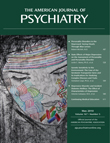Prevalence of Incompletely Penetrant Huntington's Disease Alleles Among Individuals With Major Depressive Disorder
Abstract
Objective
Presymptomatic individuals with the Huntingtin (HTT) CAG expansion mutation that causes Huntington's disease may have higher levels of depressive symptoms than healthy comparison populations. However, the prevalence of HTT CAG repeat expansions among individuals diagnosed with major depressive disorder has not been established.
Method
This was a case-control genetic association study of HTT CAG allele size in two discovery cohorts of individuals with major depressive disorder and comparison subjects without major depression as well as a replication cohort of individuals with major depression and comparison subjects without major depression.
Results
CAG repeat lengths of 36 or greater were observed in six of 3,054 chromosomes from individuals with major depression, compared with none of 4,155 chromosomes from comparison subjects. In a third cohort, one expanded allele was observed among 1,202 chromosomes in the major depression group, compared with none of 2,678 chromosomes in comparison subjects. No clear pattern of clinical features was shared among individuals with the expanded repeats.
Conclusions
In clinical populations of individuals diagnosed with major depression, approximately 3 in 1,000 carried expanded HTT CAG alleles.



